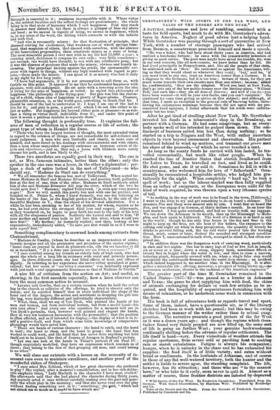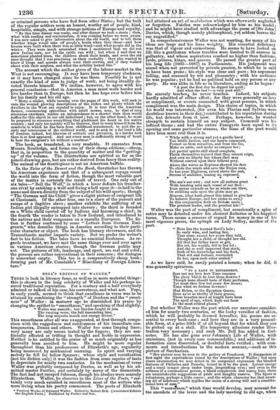GERSTAECXER'S WILD SPORTS IN THE FAR. WEST, LED TALES OF
THE DESERT AND THE BUSH..
.4 ATURAL restlessness and love of rambling, combined with a taste for field-sports, had much to do with Mr. Gersticker's adven- tures in America. Neglect of good advice lent a helping hand. While Gerstacker was passing through a sort of quarantine at New York, with a number of steerage passengers who had arrived from Bremen, a countryman presented himself and made a speech.
"He was a baker, who had been about thirty years in America, and had realized a handsome fortune; he came with the praiseworthy intention of giving us good advice. The good man might have saved his trouble, for, wise in our own conceits, like all new-comers, we knew bettor than he did. lie had lived principally in Pennsylvania, and, like all the people of that state, he addressed each as thole He cautioned us against the Americana, tell-
ing us that they would cheat us whenever they could ; I
'but,' said lie if you must trust to any one, trust an American sooner than a German. It is a disgrace to the Germans, but it is too true ; beware of them, for they am much worse towards their own countrymen than any ethers; because,' sodded he, confidentially, 'they are the simplest. When you land at New York, don't go into any of the low public-houses near the landing-place, 'William Tell,' and such like—they are all dens of thieves ; and now if you do—you have been warned—it will be your own faults, mad you can't complain.' He continued for come time giving us advice on this subject; and although, at that time, I made no exception to the general rule of knowing better, disbe- lieving his calumnious warnings because they did not agree with my pre- conceived fixed opinions, I found afterwards that his words were unfortu- nately but too true." After he got tired of strolling about New Yor'k, Mr. -a erstracker invested his funds in a tobacconist's shop in the Broadway, as partner with a German. He had some misgivings, but as every- body spoke well of his intended he gulped them down. The con- finement of business suited him less than doing nothing; so he started on a trip to Niagara and the West, with rather uncertain objects in view beyond amusement and observation. His partner remained behind to wind up matters, and transmit our green man his share of the proceeds,—of which he never touched a cent. As long as the scanty funds he carried with him lasted, he tra- velled economically, but much like other people. When he reached the line of frontier States that stretch Southward from the Lakes to Texas, he travelled on foot, and lived as he could. He shot game, and ate it or sold it. Sometimes he fell in with a countryman, who welcomed him for love of " fatherland." Ooca- sionally he encountered a hospitable settler, who lodged him gra- tuitously for the night. When completely *" hard up," he took .a spell of work; but as the labour-market was then fully supplied from an influx of emigrants, or the Europeans were unfit for the kind of work required, he was thrown upon a very irksome species of toil.
"As nothing in the way of work was to be found fa the town, rLittlerack0 I went to the river to try and get something to do on board a steamer. The steamers Fox and Harp were moored aide by aide. I went first an board the Fax, and was engaged as fireman, at thirty dollars a month. Lien hour the boat started. I was quite oontented, and had no trouble with my luggage. We ran down the Arkansas to its mouth, then up the Mississippi to Mem- phis, and back again to Littlerock. The work of a fireman is ae hard as any in the world ; though he has only four hours in the day and fear in the night to keep up the fires, yet the beat of the boilers, the exposure to the cutting cold night air when in deep perspiration, the quantity of brandy he drinks to prevent falling sick, the icy cold water poured into the burning throat, must, sooner or later, destroy the soundest and strongest constitu- tion. How I, unaccustomed to such work, managedlo stand it, has often sur- prised me. "In addition there was the dangerous work of carrying wood, particularly in dark and wet nights. One has to carry logs of four or five feet in length, six or seven at a time, down a steep, slippery bank, sometimes fifteen or twenty feet in height when the water is low, and then to cross a narrow, tottering plank, frequently covered with ice, when a single false step would precipitate the unfortunate fireman into the rapid deep stream ; an accident which indeed happened to me-another time in the Mississippi. It is alto- ge ther a miserable life ; offering, moreover, a prospect of being blown up,—,no uncommon misfortune, thanks to the rashness of the American engineers."
The greater part of the time M. Gerstacker remained in the United States-1837-'42—was passed as a hunter in Arkansas and Texas; the game he shot supplying him with food, the skins of animals exchanging for dollars or suoh few articles as he re- quired, and the hospitality of acquaintances furnishing him with means of relaxation, or he undertook some work in connexion with the farm.
His book is full of adventures both as regards travel 'and sport. Some of them, indeed, have a questionable air, as if the literary sketcher had been at work with his pencil; but this may be owing to the German manner of the writer rather than to actual exag- geration. The narrative presents a good picture of the far West as it was a dozen years ago ; and though the regions which Oen- theker found very thinly peopled are now filled up, the same sort of life is going on further West ; your genuine backwoodsman continually shifting before the advance of regular settlement. The life itself is hard—very. Every -vicissitude of weather attends the regular sportsman, from severe cold or parching heat to soaking rain or marsh exhalations. Fatigue is always his -companion; hunger, when he is unlucky in the chase and he has exhausted his supplies : the food itself is of little variety, and eaten without bread or condiments. In the lowlands of Arkansas, and of coons in those of any flat well-watered territory, both the hunter and the settler is liable to severe ague, the standing complaint. The life, however, has its attraction ; and those who are -" to the manner born," or who take to it early, seem never to quit it. Almost as a matter of course, these frontier districts are infested by depraved • Wild Sports of the Far West. By Frederick Gersfacker. Translated from the German. With tinted Illustrations, by Harrison Weir. Published by Routledge and Co.
Tales of the Desert and the Bush. From the German of Frederick Gerstacker. Published by Constable and 'Co.
or criminal persons who have fled from other'States ; but the bulk of the regular settlers seem an honest, worthy set of people, kind, hospitable, simple, and with strange notions of Europe and royalty. " By this time dinner was ready, and after dinner we took a siesta ; then, what with reading and conversation, it was evening before we were aware. I was now asked to give information about the old world, and to tell them whether kings would take off people's heads when they chose—and how houses were built when there was so little wood—and what people did in the winter. They were much astonished when I mentioned that we did not grow Indian corn, nor let the cattle run wild ; but when I said that we sometimes planted trees, the children shook their beads, and even the old ones thought that I was practising on their credulity : they also wanted to know if kings and queens always wore their crowns, and if they walked about with their sceptres, and what the nobility looked like."
The account which the author gives of the labour-market in the West is not encouraging. It may have been temporary slackness, or it may have changed since he was there. Possibly he is not exactly the kind of man to judge of work, not being steadily de- voted thereto himself. We incline, however, to agree with his general conclusion—that in America a man must work harder and live harder than in Europe, but then he has hope ever before him for his family and his old age.
" Many a reader, while turning over the pages of this work, will seek in vain the wonted glowing descriptions of the riches and plenty which the dwellers in the West are reputed to enjoy. It is true that the American farmer, commencing ogerations with small means, may, by dint of very strenuous exertions, realize an independence in a shorter time than would suffice for this object in our old fatherland ; but, on the other band, he must be prepared to renounce everything that gladdened his heart in his native country ; and only too quickly will he discover that to wean himself from the oomforta to which he has been from childhood accustomed, to quit the so- ciety and intercourse of the civilized world, and to seek in a far land a life of freedom indeed, but likewise of solitude and privation, is a harder task than it at first appeared. And not every man is sufficiently strong of heart to bear the emigrant's lot without a murmur."
The book, as translated, is very readable. It emanates from Messrs. Routledge and forms one of their cheap editions,—cheap, that is, in proportion to the quantity of matter and the " getting- up " of the volume. The illustrations are spirited as far as the pencil-drawing goes, but are rather derived from fancy than reality. The animal of the frontispiece is not an American buffalo.
In the Tales of the Desert and the Bush, Gerstiicker has thrown his American experience and that of a subsequent voyage round the world into the form of fiction, though the most valuable part of the matter is certainly the result of travel. One only out of six tales—" Bell the Wolf," in which a lover defeats his treacher- ous rival by catching a wolf and fixing a bell upon it—is laid in the soeneand drawn directly from the subject of his wild sports ; though "The German and his Child" gives a slight picture of emigrant life at Cincinnati. Of the other four, one is a story of the pursuit and escape of a fugitive slave ; another exhibits the suffering of an Indian girl illegally entrapped into slavery; the third is founded on a White child carried off by Indians and becoming a chief; in the fourth Vie reader is taken to New Zealand, and introduced to the natives and their" vengeance on a rascally European. The fic- tion is further continued by some " Letters from German Emi- grants," who describe things in America according to their parti- cular character or object. The book has literary cleverness, and its Transatlantic matter imparts variety. But we prefer the writer's fact to his fiction. The tales have no essential freshness. As re- gards treatment, we have met the same things over and over again in various American stories; though the German public may not. The pictures of life, landscape, and sport, are real and solid; the persons are rather conventional in their romance ; the dialogue is somewhat empty. This too is a comparatively cheap book; forming part of Mr. Constable's " Miscellany of Foreign Litera- ture."



























 Previous page
Previous page